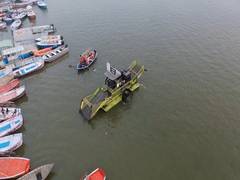Over 30 flamingos killed after being hit by aircraft in Mumbai; environment activists seek probe
Mumbai, May 21 (PTI) More than 30 flamingos were killed after allegedly being hit by an aircraft in Mumbai, police said on Tuesday, as environmental activists demanded a probe into it by the DGCA and claimed urban planners had ignored warnings about such disasters.
So far, carcasses of 32 flamingos have been recovered from Ghatkopar area, the police said.
The birds were hit by the aircraft before it landed here on Monday night, a police official said.
Various calls were received from people about the dead birds spotted at some places in Ghatkopar, said Pawan Sharma, founder of the Resqink Association for Wildlife Welfare (RAWW) and honorary wildlife warden with the forest department.
The forest department’s mangrove cell along with the RAWW teams during a search operation found 29 dead flamingos in the area on Monday night, he said.
Three more carcasses were found dead on Tuesday, he said.
Stray dogs scavenged a few birds after they fell on the ground and some of the animal body parts were also spotted by locals, Sharma said.
The carcasses were sent for an autopsy and would later be disposed of as per the protocols, he said.
The Wildlife Conflict Mitigation and Management Plan needs to to reviewed and revised by the airport authorities based on proper evaluation of the situation in coordination with the forest department and wildlife experts so that such incidents can be avoided in future, RAWW secretary and zoologist Chinmay Joshi said.
NatConnect Foundation director B N Kumar in a release said he has sent an email to the Directorate General of Civil Aviation (DGCA), and sought a high-level probe to ascertain how the Emirates aircraft hit the birds and whether the pilot could not notice the flock on his radar.
“We are sad to say that it was a disaster waiting to happen,” said the foundation working for environmental causes.
“Had any passenger been affected due to the bird hit, it would have made global headlines, but the death of 40 flamingos does not seem to bother the authorities, urban planners in particular,” Kumar said.
The flamingos were apparently on their return from Mumbai to Gujarat and their death is a warning to human beings of the impending disasters, Bombay Natural History Society (BNHS) researcher Mrugank Prabhu said.
Nearly a lakh flamingos keep flying to the Thane Creek Flamingo Sanctuary, which is a Ramsar site, NatConnect said.
The NGO, which along with other environment-focused organisations has been conducting a series of campaigns to save Mumbai’s biodiversity, wetlands and mangroves, cautioned that the upcoming international airport in neighbouring Navi Mumbai could also be prone to such incidents.
This is because the wetlands and the flamingo abodes in Navi Mumbai are being systematically buried despite warnings from organisations such as BNHS, it said in the release.
The birds, if they miss their traditional destinations, could land at the Navi Mumbai airport site which has mudflats along the Panvel Creek, it said.
As part of the wildlife mitigation measures for the Atal Setu, the state government had planned bird sanctuaries at Sewri-Mahul, NRI-TS Chankaya and Panje-Dongari wetlands and other places, the release claimed.
“The Atal Setu is operational but we have not heard anything about protecting the wetlands,” Kumar said.
NatConnect said the upcoming Navi Mumbai airport has committed in its Environment Impact Assessment (EIA) report that the wetlands as outlined by BNHS would be preserved.
The EIA, submitted for renewal of the environmental clearance (EC) for the Navi Mumbai airport, has also said that a golf course, planned on the NRI wetlands, was cancelled.
“This gave us the hope that wetlands would be preserved, yet the systematic destruction of water bodies is on,” NatConnect said.
These birds have a right to their habitats, of which the Mumbai Creek and its satellite wetlands are a crucial cog in the wheel, Kharghar-based activist Nareshchandra Singh said.
“We need to carefully maintain the ecological and environmental balance at and around these habitats, otherwise expect such incidents,” Singh said.
Sandip Sareen of the Navi Mumbai Environmental Preservation Society said the incident is heart-wrenching.






